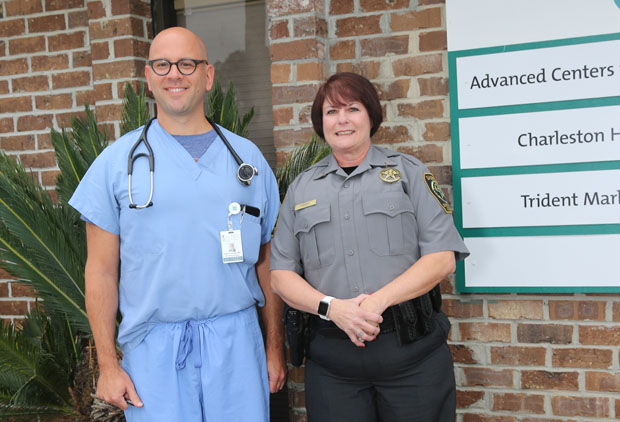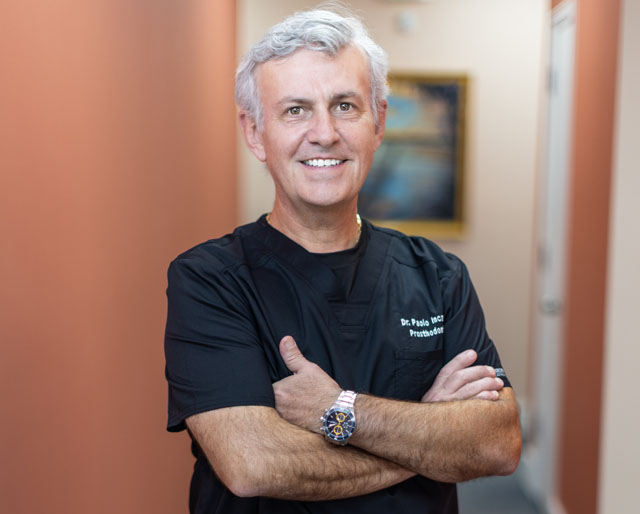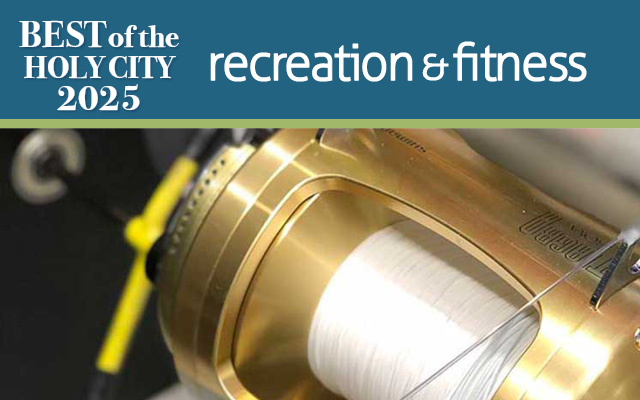Listen to Your Heart
04 Jan 2018
Knowing your body and listening to it can mean the difference between a healthy life or a devastating alternative
By SYBIL FIX

Songs and poetry say it. And of course, mothers and grandmothers. But no one is better poised to utter the words, “Listen to your heart!” than those who, as they say, have literally been down that road. Those whose hearts were struggling, for a variety of reasons, and who are alive today because they listened, or, conversely, because they didn’t, and are miraculously lucky.
In honor of Heart Health Month, we bring you the stories of two women: Kim Farst and Terri Hix, whose cardiac problems and survival offer important lessons of wisdom, as well as of grace and gratitude.
For sure, the health of our bodies is rarely immune to the devastating force of life’s grief and challenges. “It’s important to listen to your body, and if you feel anything strange, you should pay attention and go see someone. Your heart gives you signs ahead of time,” says Farst, 53, of Summerville.
Not Here Forever
A school resource officer for the Dorchester County Sheriff’s Department with 27 years in law enforcement, Farst was a buoyant mother of a sixth-grader, a runner and a doer, when she began experiencing fainting spells, dizziness and weakness. She went to a cardiologist but an EKG showed nothing and she returned to her normal life.
But normal it wasn’t, and again she experienced the symptoms. She returned to the doctor, and was finally sent to see electrophysiologist Dr. Darren Sidney, whose specialty is heart rhythm disorders caused by the electrical circuit of the heart. Farst was diagnosed with a common, curable congenital condition called supraventricular tachycardia, and in 2013 had what is called a simple ablation—a procedure in which cells, usually in small focused numbers, whose behavior is throwing off the heart’s conduction system, are burned through radiation.
The procedure was successful and Farst returned to live as before. Two years later her husband was diagnosed with cancer—he passed away quickly thereafter, at age 49—and the symptoms returned. The feeling of blacking out and the spots before her eyes were easily attributable to stress—and may have been brought on by it—but Farst was not satisfied with that answer and she returned to Sidney again and again until he decided to insert a portable heart monitor to study her heart.
While training for a half marathon at the end of 2016, the symptoms quickened and worsened, and she received a final diagnosis of atrial fibrillation. Commonly called A-fib, it causes an intense quickening in the beating of the atria, and this led to a second, more complex ablation to burn more tissue in multiple points of the heart.
Today, Farst feels great. She is boxing, running and enjoying a sense of wellbeing. But her heart is still being monitored and for this she is grateful.
“It’s been a real eye-opener,” she said. “I am very vigilant, and because my husband died so young, I am very aware. It brings home the fact that just because you are young, it does not mean you are going to be here.”
For women especially who are busy raising children and taking care of others, listening to one’s own body often can be a last priority, almost an inaudible whisper. “Pay attention to yourself,” Farst cautions.
Sidney echoes that wisdom, bolstered by a stack of medical evidence. Cardiovascular disease is on the rise and it remains the number one killer of women, for whom symptoms are often different than they are for men. A-fib is now being diagnosed in younger and younger patients, in part because the medical community, more vigilant to its presence, is looking for it and better prepared at treating it. Because it is a condition that tends to become progressively worse through time, with longer, more frequent, and more acute episodes, treatment is essential.
“We have better monitoring and better diagnostic equipment, and if we are aggressive at treating it, we can prevent it from getting worse,” said Sidney, who practices with Charleston Heart Specialists and is medical director of electrophysiology at Trident Medical Center.
But patients play an important role in their own care. Some are finely synched with their bodies while others are oblivious.
“You have to be your own advocate. It’s a judgment call, but when something doesn’t feel right, if you are worried you need to tell your doctor. Do not keep these things a secret,” says Sidney.
Particularly because A-fib cannot be detected through an EKG, a patient’s sense and reporting of his or her own heartbeat is often an essential first step to detection.
“Having palpitations is a common thing, and most often it is nothing, so people often get brushed off for being crazy,” said Sidney. “But they will tell you, ‘I know something is wrong,’ and when you put a heart monitor on them, you find out that there is ... We are taking the complaints very seriously now.”
Even patients who may have already had one procedure should be listening to their heart. “Just because you are ‘cured,’” said Sidney, “it does not mean you should not seek help if you are having a problem. Early diagnosis can prevent you from ending up in the ER.”
Lucky to be Alive
Early diagnosis is what helped save Terri Hix, of Mount Pleasant—fortunately.
Hix, also 53, was born with a hole in her heart. She didn’t know until she was a teenager in Seattle and continuously began to feel tired. A surgery and a few years later she was off to college and to her life, eventually here in South Carolina.
“After the surgery I felt like a new person,” she said.
Then, in 2015 her father became sick and she traveled several times back and forth to the West Coast to see him, until he eventually died.
Her heart began showing signs of distress.
“I didn’t think about it, but I felt tired and my heart was racing,” the mother of four says, looking back. Though she had a very slow resting heartbeat, she was diagnosed with A-fib, and in order to “reset” her heart from arrhythmia, she underwent cardioversion, a procedure by which the heart is stopped and shocked into a normal rhythm.
A series of cardiac events followed: She had another cardioversion in early 2016 after she went into arrhythmia following a stress test, and on Mother’s Day weekend of that year, when her cardiologist attempted to put her on a drug to regulate her highly symptomatic A-fib, she went to sleep and flatlined. She ended up in the ICU for five days.
“They were looking for a solution, but with my slow resting heartbeat it was not working,” says Hix.
After that she enjoyed more than a year of relative peace, but her heart was not done suffering—not yet. On a beautiful morning in early fall 2017 she found her adored dog, Tommy, a Westie, drowned in the swimming pool. The loss was inexplicable and crushing.
“I was devastated. It was very, very hard to deal with…and obviously I got my heart rate up,” she said, still tearing up at the memory of it all.
The following day, after a walk on the beach, she took her husband to the dentist. On the way, she said, “I was getting upset again, and crying, and I got this strange feeling. My hands were tingling and I was super dizzy.”
While waiting for her husband in the car outside she went into cardiac arrest. Her heart simply stopped. Fortuitously, when it happened she had been talking on the phone with her daughter in Colorado, and when she dropped the phone her daughter immediately called her father, who ran outside from the dentist’s office and with others performed CPR on Hix until the ambulance arrived and took her to the hospital.
“It was a miracle that I had not locked the car, that I was on the phone when it happened, and that my daughter called my husband,” says Hix, still shaken. “It was all a miracle.”
A few days later Hix got a pacemaker. She is still getting used to the idea of a foreign body in her, and still wrestles with the fact that she was transported to MUSC by screaming ambulance and she remembers nothing of it. “I was gone, basically, and passing out somewhere and waking up somewhere different bothers me. It’s strange. I was blessed that this happened the way it did,” she said.
Thinking back, Hix hones into the couple of weeks before she went into cardiac arrest. She had been playing tennis and her heart had been racing. She had felt tired, but she dismissed it.
“I thought it was the heat, and maybe I was dehydrated,” she said. “I didn’t listen. Between the crying and not eating and being upset, it all took a toll.”
Certainly Hix’s is not an uncomplicated case.
Her doctor, Dr. David Gregg, is an adult congenital cardiologist and director of the Medical University of South Carolina’s newly accredited department of adult congenital cardiology, one of 12 in the country devoted to patients who have transitioned from childhood into adulthood with a congenital heart problem and who often underwent heart surgery in childhood.
He said the challenges of Hix’s condition—which required balancing a slow resting heartbeat with the onset of A-fib, not uncommon but tricky—likely dates back to the initial congenital heart problem with which she was born. Therein lies another lesson, he said, which is at the core of his department and field of medicine.
“Most childhood heart surgeries are fantastic now, but they are not complete fixes and they will often need follow-up care,” he said. Patients in that category need to be particularly aware of their heart.
Gregg points out that often people who think they are having an A-fib episode are not, and often they don’t realize it when they are. In any case, he cautions, “A confused symptom can relate to the heart, and certainly people with a heart condition need to take that seriously.”
Hix, on her part, feels good again these days. “My heart feels calm and peaceful beating at its regular beat…but I still miss my dog.”
She is silent a moment.
“When you’re in good health you take everything for granted. This has given me a whole new appreciation for everything,” says Hix. “It makes me think twice about everything—how fragile life is and how quickly everything can be taken away from you. I feel very lucky for being here today.”












